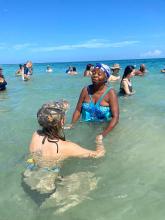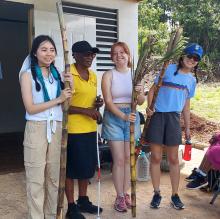In the wake of the pandemic, the return to a ‘normal’ school experience for many UW students means the opportunity to participate in new experiences that had long been suspended. For 18 students, this meant participating in the experiential learning opportunity of a lifetime while spending three weeks in the beautiful country of Jamaica this past summer. “Disability, Aging, and Development in Jamaica'' is led by Professor Stephen Meyers, professor in the Law, Societies, and Justice Department and the Jackson School of International Studies, and co-director Christine Lew, a Disability Studies Program alum. Professor Meyers had offered the Jamaica program once before in 2019. He was thrilled to have the chance to run the program again. I interviewed Professor Meyers, and two students who attended the trip to learn more about why he chose Jamaica and what he and his students learned during their time there. Jamaica was the first country to sign the United Nations Convention on the Rights for Persons with Disabilities. Jamaica has always been a strong proponent of disability rights and has a rapidly aging population. In fact, Jamaica was among the first to develop a national policy
for senior citizens and is home to many non-profit organizations serving aging and disabled populations. It’s hard to disagree that Professor Meyers chose a great location for his students to learn more about disability rights.
The first week of the program, the team traveled to Kingston where they stayed at Kingston University of the West Indies. In Kingston, the students got the chance to visit and interact with a variety of national organizations including the Jamaican Society for the Blind, Jamaican Council for People with Disabilities, Combined Disability Association, DeafCan Coffee, US Agency for International Development, Jamaican Society for the Blind, UNICEF, Sir John Rehabilitation Center, Abilities Foundation, and the National Council for Senior Citizens. Students learned about the changes that the Jamaican government is making to better support and include their aging and disabled populations. The group first focused on national policies before
learning about the work of smaller grassroots organizations.
Next, the group went to the Discovery Bay Research Lab, where the team worked with the St. Ann Disability Association, a grassroots disability rights advocacy organization that recently acquired its own farm, which they have turned into an agricultural cooperative. A favorite memory of one student who participated in the program, Abby Horton, was participating in water aerobics with the Runaway Bay Senior Club. Abby shared a special moment with one of the senior citizens, Dolores, who was scared to participate without the help of her daughter, who is normally there. (A picture of Abby and Dolores is shown below). I asked Abby what her biggest takeaway from this Study Abroad program was and she said, “The people of Jamaica were so warm and welcoming and so excited to share their culture and it makes me want to be proud of what I do and share my work.”
The final stop was in the Central Mountains of Jamaica, where the group stayed in the Jamaican Deaf Village. In this community, deaf individuals and their families can come and live for several years. The Deaf Village is a place where Jamaican Sign Language dominates, and many of the community residents and Deaf persons from the surrounding area work in a variety of economic enterprises ranging from raising livestock to furniture making and a sewing cooperative. While staying in the Mandeville area at the village, the team worked with Intergenerational Jamaica, a senior citizens advocacy organization, and visited schools where senior citizens act as mentors, grassroots organizations, and the Ebenezer House, a home for
older men who are homeless or abandoned by their families. These men often have severe mental health conditions and are often recovering from substance addiction. At the Ebenezer House, these men can learn to take care of themselves and get jobs. These men stay at the home free of charge and focus on their mental and physical health. This house is run completely by volunteers, often older people who are looking to give back to their community. A student on the trip, Jocelyn Youn, commented that “it really feels like everyone cares about each other, there are even days that it is open to the public and anyone can come in and take a shower.”


